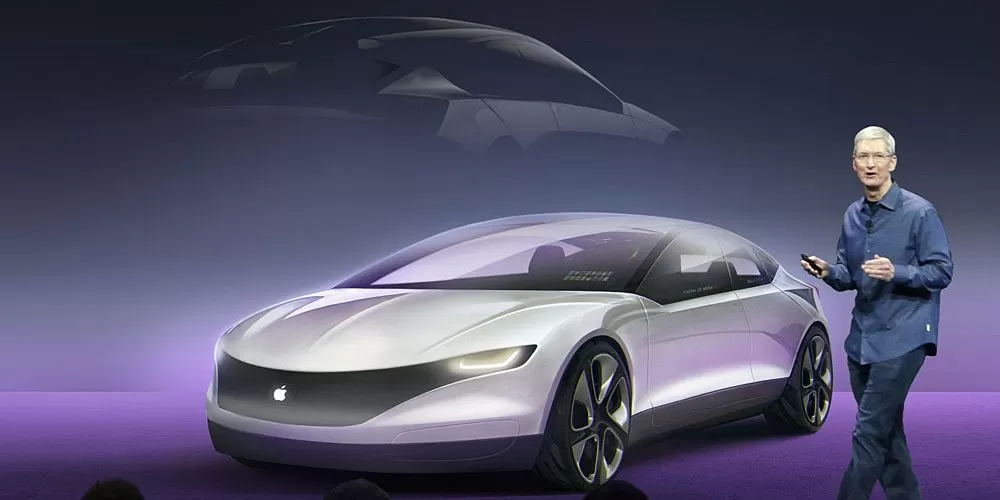After years of speculation, Apple has officially decided to halt its long-anticipated “Project Titan” electric car project. This move, announced internally on Tuesday, represents a significant shift in the company’s strategy, redirecting resources from the 2,000-person team behind the project toward developing generative AI technologies. Apple, known for its secrecy and ambitious innovation, is now charting a new course that may redefine its focus in the years ahead.
Project Titan: Years of Development and Speculation
Project Titan has been a topic of industry rumors since its inception in 2015. Over the years, Apple strategically hired top talent from Tesla and other electric vehicle (EV) startups, assembling a powerhouse team that aimed to bring Apple’s vision of an electric car to life. Despite its secrecy, reports suggested that Apple had made significant progress, with the project logging over 45,000 miles using autonomous driving technology in 2023 alone.
However, despite these advancements, internal challenges and delays plagued the project. Leadership changes and skepticism within the company raised questions about the feasibility of creating an Apple-branded electric vehicle. Originally envisioned as a car that would compete in the growing EV market, Project Titan was rumored to launch by 2028, with an initial price point under $100,000. But even with these targets, it seems Apple could not overcome the hurdles necessary to bring its ambitious EV to market.
Apple’s Strategic Pivot: From EVs to AI
The decision to halt Project Titan signals a broader shift in Apple’s strategic priorities. In a meeting with employees, key figures such as Chief Operating Officer Jeff Williams and Vice President Kevin Lynch delivered the news, marking the end of Apple’s direct pursuit of a self-driving electric car. Instead, Apple is redirecting its focus to generative AI initiatives, particularly those tied to the company’s recent investment in the Ajax AI model.
Apple’s decision to pivot away from the electric vehicle market may come as a surprise to many, especially considering the momentum the project seemed to have in recent years. However, CEO Tim Cook has long emphasized the importance of AI in shaping the company’s future. His recent confirmation of plans to integrate generative AI features into Apple’s ecosystem further solidifies the company’s commitment to this new direction. By halting Project Titan, Apple is effectively doubling down on AI development, which Cook and his team believe will play a pivotal role in the next generation of Apple products.
The Challenges of Project Titan
Project Titan was not without its challenges. Over the years, Apple faced several hurdles in developing an electric vehicle that could meet its high standards. One major obstacle was the company’s struggle to design a car that would meet consumer expectations for both luxury and cutting-edge technology. Reports suggest that the car may not have delivered the advanced self-driving capabilities originally envisioned, a key feature that Apple hoped would differentiate its vehicle from other competitors in the market.
Another significant challenge was the high level of competition in the EV space. Companies like Tesla have dominated the market for years, and other tech giants, such as Google’s Waymo, have made considerable progress in autonomous driving technology. Despite Apple’s substantial resources, breaking into this highly competitive market proved more difficult than anticipated.
A New Focus on Generative AI
With the closure of Project Titan, Apple’s attention is now firmly set on generative AI, a field that has become increasingly important in recent years. Generative AI refers to the use of AI algorithms to create new content, such as text, images, and videos, often with little to no human input. This technology has the potential to revolutionize a wide range of industries, from entertainment and media to business and education.
Apple’s Ajax AI model is at the heart of this shift. By focusing on AI development, Apple is aligning itself with one of the most transformative technological trends of the decade. Generative AI has already shown promise in various applications, from enhancing Siri’s capabilities to improving Apple’s Photos and Mail apps. The company’s substantial investment in AI technologies suggests that it sees this area as a critical growth opportunity.
Industry Reactions: Other Players Continue to Push Forward
While Apple has pivoted away from the electric vehicle market, other companies are pressing ahead with their automotive ambitions. Sony and Honda, for example, are moving forward with the development of their Afeela electric cars, which will feature autonomous driving capabilities. These vehicles are set to begin preorders soon, signaling continued innovation in the EV sector.
Sony’s collaboration with Honda showcases the growing trend of tech companies partnering with traditional automakers to bring advanced features to electric vehicles. As more companies enter the EV space, Apple’s decision to pull back from Project Titan highlights the challenges of competing in such a crowded and fast-evolving market. Despite Apple’s withdrawal, the race to develop self-driving cars remains a priority for many, and consumers will likely see more advancements from other major players in the coming years.
The Impact on Apple’s Future
Apple’s decision to halt Project Titan may mark the end of its electric car aspirations, but it opens new doors for the company in the world of AI. By shifting its resources and focus to generative AI, Apple is positioning itself to lead in an emerging field that has the potential to transform consumer technology. AI-powered innovations, whether in virtual assistants or augmented reality, could shape Apple’s product line for the next decade.
This move also signals a change in Apple’s long-term vision. While the company may no longer pursue an electric car, it continues to prioritize innovation in other areas. Whether through AI, augmented reality, or new hardware developments, Apple’s future remains rooted in its ability to push the boundaries of what technology can do.
Conclusion: A Strategic Shift Toward AI
The decision to halt Project Titan reflects Apple’s willingness to pivot when necessary, refocusing on areas where it can make the most impact. While the electric car industry remains competitive, Apple’s choice to direct its attention toward generative AI suggests that the company sees greater potential in the AI space. With significant investment in the Ajax AI model and CEO Tim Cook’s confirmation of future AI-powered features, Apple’s shift toward AI represents a new era for the tech giant.
For those interested in learning more about Apple’s latest AI developments and how they might influence the company’s future, check out the best camera smartphones in Sri Lanka to stay updated on the latest tech news. For a deeper dive into Apple’s strategic moves and AI focus, visit JW7’s platform for all the latest updates.


